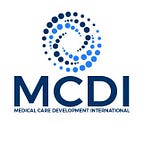Strengthening Malaria Diagnosis in Post-Ebola Guinea
With tabletop fans whirring from all directions in a university laboratory in Guinea, some of the crucial players in the country’s fight against malaria are gathered around the laboratory benches. With eighteen microscopes lined around a room, each of the lab technicians attending this malaria diagnostic refresher training is strengthening his or her knowledge and technical skills in diagnosing malaria, which is an essential step in securing proper treatment, preventing drug resistance, and tracking the disease’s prevalence within the country. Guinea, whose health system was overrun by the 2014–2016 Ebola crisis, is engaged in an effort to rebuild its diagnostic capabilities against malaria with the support of MCDI.
Since the “no-touch policy” surrounding Ebola has been lifted, health providers have resumed confirmation of suspected malaria with rapid diagnostic tests and microscopic diagnosis. An important role of the microscopic diagnosis of malaria in current-day Guinea is to help convince health care providers not to treat patients who have received a negative rapid diagnostic test result, but who continue to experience fever. Malaria microscopy is often used as a confirmatory test to rule out malaria and move on to the correct diagnosis to save more lives in Guinea.
MCDI has partnered with RTI International, Jhpiego and the Centre Africain de Formation pour le Développement (CENAFOD) to reduce malaria prevalence in Guinea. Guinea’s entire population is at risk for malaria year-round. The StopPalu+ Program, led by RTI, supports the Guinean National Malaria Control Program to reduce the country’s malaria burden by strengthening the government’s capacity to improve prevention, diagnosis, and treatment of malaria. The program is funded by the USAID-led U.S. President’s Malaria Initiative (PMI) and is a follow-on to the RTI-led StopPalu program that began in 2013.
Working hand-in-hand with Guinea’s National Malaria Control Program, MCDI is providing technical expertise to improve malaria diagnostic capacities at all levels of the health system. This includes training of trainers (TOT) in laboratory and rapid diagnosis, testing the competency of, supervising, and certifying laboratory technicians, as well as leading internal and external quality assurance of malaria microscopy. MCDI has also developed specialized training materials, hands-on practice sessions, and job aids related to routine microscope care and basic maintenance to extend the useful life of laboratory equipment.
In the first six months of the new project, MCDI has conducted four malaria diagnostic refresher trainings for 74 current lab technicians in Conakry, Labé, Coyah, and Boké. MCDI also facilitated a TOT workshop in the capital city of Conakry, which trained twelve advanced laboratory technicians from different health districts throughout the country on how to train and supervise fellow laboratory specialists in the conduct of malaria diagnosis.
Accurately diagnosing malaria using light microscopy is an acquired technical skill that requires regular practice, as well as proper equipment and supplies such as lab reagents. MCDI’s basic and advanced sessions train participants in diagnostic theory, as well as in the detection of malaria parasites in the blood, identification of parasite species, and counting the number of parasites to calculate the density of infection. These skills are essential to effectively treat patients during case management, monitor the disease’s prevalence, and stop its transmission. Building and broadening a solid foundation of laboratory technicians that can accurately diagnose malaria throughout the country is essential to the reduction of malaria morbidity and mortality rates.
StopPalu+ will continue the work of the StopPalu program and will address the remaining gaps in malaria prevention and control by supporting essential health service delivery, behavior change communication, capacity building and supervision, disease surveillance, and monitoring and evaluation. The effort will work across 19 districts in Guinea to increase the use of insecticide-treated nets, provide preventive therapy for pregnant women, and strengthen prompt care-seeking and treatment. The program has an overall budget of approximately $28 million and is expected to run through December 2022.
In the coming months, MCDI will facilitate onsite Outreach, Training and Supportive Supervision (OTSS) sessions with area health facilities who have had technicians receive diagnostic training. OTSS, a system developed during the MCDI-led Improving Malaria Diagnosis project (IMaD, 2007–2012), is a method in which the quality of diagnosis is ensured at the health facility level and lab technicians’ skills are routinely reinforced through competency testing and coaching. MCDI has developed and expects to build on a malaria blood slide archive for the country, to allow for more efficient routine training. MCDI has developed similar national slide archives in several other African countries.
